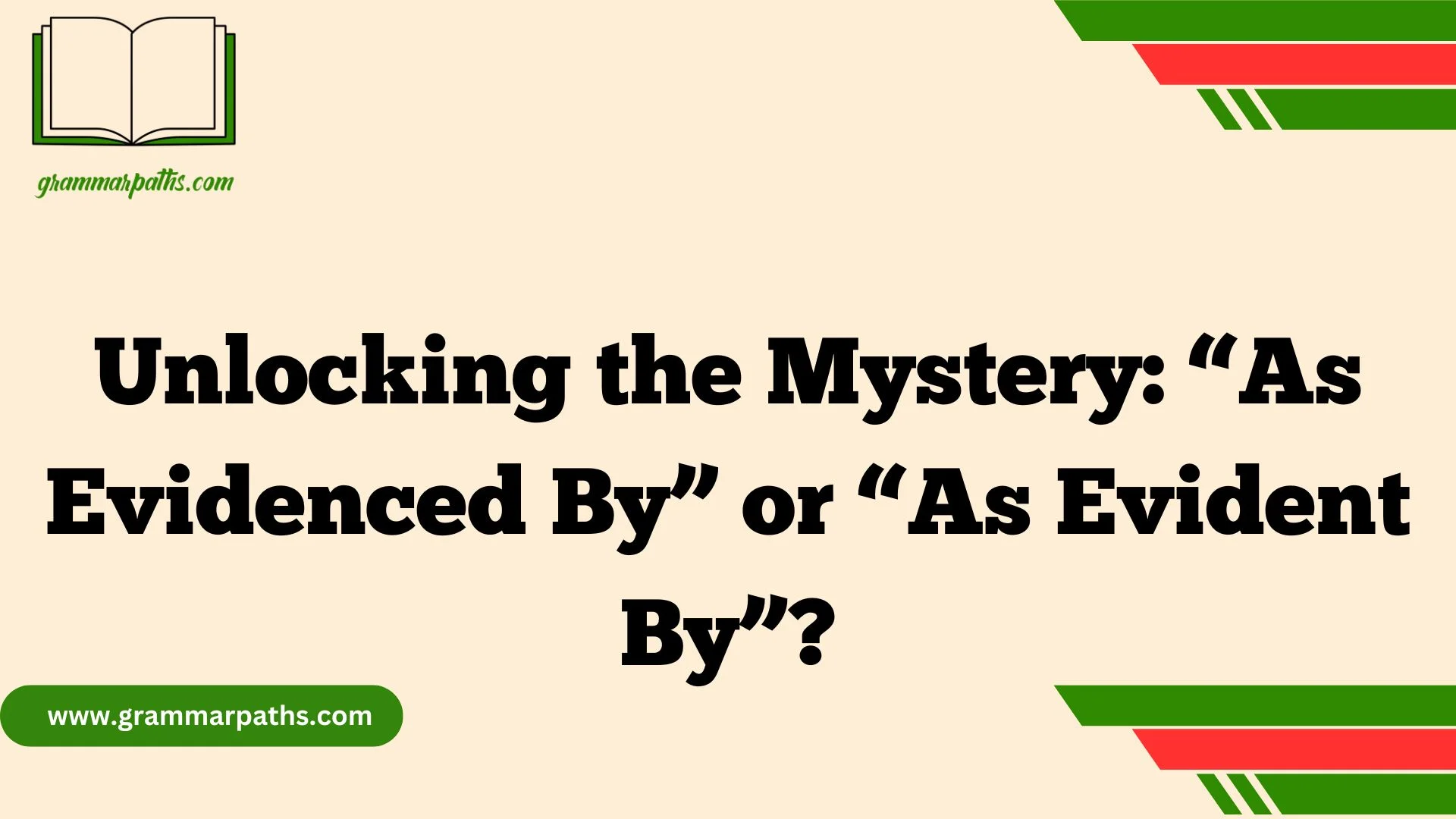Have you ever paused mid-sentence, second-guessing a phrase that seemed perfectly natural—only to wonder if it would pass a grammar test in formal English? You’re not alone. One expression that often sparks confusion, especially in academic writing and business communication, is the subtle but critical difference between “as evidenced by” or “as evident by.” At first glance, they might appear interchangeable. But under grammatical scrutiny, one clearly holds the upper hand in professional communication.
In today’s fast-paced world of business report writing, academic paper grammar, and polished writing, every phrase matters. Choosing the right expression can make the difference between sounding refined or careless. That’s why understanding the difference between “evident” and “evidenced”, and knowing the correct grammar usage, is crucial for achieving writing clarity and maintaining a professional tone.
So, is “as evident by” correct? What’s the correct phrase in English when you want to support a claim or reference a fact? We’ll break it all down with real-world language examples, explain the past participle of ‘evidence’, and explore how subtle grammar errors can affect sentence construction in both academic vs business grammar.
Whether you’re looking to improve English fluency, avoid commonly misused phrases, or simply want to sound more authoritative, mastering the correct expression will elevate your writing. Let’s unlock this grammar mystery and discover why “as evidenced by” is the clear winner when it comes to formal English.
Brief Context: Why This Pair Matters
Choosing accurately between adjective-based and past-participle constructions enhances credibility. It’s not fluff—it’s substance. If you’re writing for professionals, academics, content marketing, or everyday communication, this small nuance signals confidence and clarity to your audience.
Definition Clarification: “Evident” vs “Evidence”
Before comparing the phrases, we must understand their roots.
What Does “Evident” Mean?
- Part of speech: Adjective
- Meaning: Clear, obvious, apparent
- Example: It’s evident she practiced a lot.
- Why it matters: It describes how clear something is, not what supports it.
What Is “Evidence”?
- Part of speech: Noun
- Meaning: Facts or information supporting a conclusion
- Example: The evidence supports her claim.
- Importance: It grounds your statements in proof.
Quick Grammar Refresher
| Term | Part of Speech | Use Case |
| Evident | Adjective | Describing something obvious |
| Evidenced | Past Participle | Pointing to something shown or proven |
| Evidence | Noun | The data or reasons backing a claim |
Remember, adjectives describe; participles show action or completed state. Spelling matters—and it matters to your credibility.
As Evident By: When Clarity Speaks Volumes
Use “as evident by” when you’re stating an obvious fact, not necessarily citing formal proof.
Structure Overview
vbnet
CopyEdit
As evident by + noun/clause
- Role: Signals something is clear or obvious
- Tone: Neutral, objective, straightforward
Common Examples
- As evident by the sunrise, morning has arrived.
- As evident by her steady hand, she’s done this before.
Appropriate Contexts
- Descriptive writing (profiles, narratives)
- Casual observation (blog posts, everyday commentary)
- When formal proof isn’t required
Quick Tips (Checklist)
- Are you describing a visible or clear quality?
- No need to reference a study or formal proof.
- Think surface-level clarity.
As Evidenced By: Lean on Research and Data
This phrase leans into the proof side of things. It points back to something substantial—like study results, documents, or numbers.
Structure Summary
vbnet
CopyEdit
As evidenced by + noun/clause
- Role: Introduces proof, backing, or reasoning
- Tone: formal, authoritative, evidence-driven
Sample Sentences
- As evidenced by the 2024 survey, remote workers report higher job satisfaction.
- Market demand dropped, as evidenced by a 15% decline in orders.
Best Use Cases
- Research writing (essays, research papers)
- Business reports (market analyses, case studies)
- Data-led content (white papers, technical documentation)
Checklist for Writers
- Are you referring to data or documents?
- Include relevant statistics, dates, or research sources.
- If it’s not obvious to the reader, back it up with this phrase.
Common Pitfalls & Practical Solutions
Writers often mix up these two phrases. Here’s how to avoid that trap:
- Check the purpose: Are you describing, or proving?
- Clue words to look for:
- Evident: looks, seems, appears
- Evidenced: shows, data, study, figures
- Evident: looks, seems, appears
- Self-check:
- If you can’t cite something, don’t use evidenced.
- If you’re not describing clarity, don’t use evident.
- If you can’t cite something, don’t use evidenced.
Side-by-Side: Direct Comparison
| Phrase | Role | Example |
| As evident by | Highlights obvious clarity | As evident by his grin, he won. |
| As evidenced by | Introduces formal proof | As evidenced by audit reports, profits rose. |
Practice Makes Perfect
Test your usage with these fill-in-the-blanks. Then check the answer key to see why your choice fits.
Sentences to Try
- ___ the feedback forms, the workshop was a success.
- ___ the color of the sky, rain is likely.
- ___ the audit, inventory losses dropped.
- ___ his relaxed posture, he felt comfortable.
Answer Key
- As evidenced by – referring to data from feedback forms
- As evident by – looking at the sky’s appearance
- As evidenced by – pointing to audit as proof
- As evident by – describes his visible posture
FAQS
Is it as evident by or as evidenced by?
The correct phrase is “as evidenced by”, not “as evident by.” It means something is shown or demonstrated by a fact or example.
How to use as evidenced by in a sentence?
Use it to show proof or support, e.g., “She is a great leader, as evidenced by her team’s success.”
How do you use evidenced in a sentence?
Evidenced is used to show something was proven or demonstrated, e.g., “His guilt was evidenced by the fingerprints on the door.”
When to use evident or evidence?
Use evident as an adjective meaning clear or obvious (e.g., “It was evident she was upset.”), and evidence as a noun meaning proof (e.g., “There is strong evidence against him.”)
Is evidenced grammatically correct?
Yes, evidenced is correct and is the past tense of the verb to evidence, meaning to show or demonstrate clearly.
Conclusion:
In the debate between “as evidenced by” and “as evident by,” there is a clear winner when it comes to correct and professional English usage. The phrase “as evidenced by” is the grammatically correct and widely accepted form. It is commonly used in academic writing, formal reports, and legal documents to introduce clear proof or support for a statement. On the other hand, “as evident by” is considered incorrect and should be avoided in formal contexts.
By understanding the grammatical structure behind these expressions, you’re better equipped to write with clarity and authority. Remember, using proper phrases like “as evidenced by” not only strengthens your message but also boosts your credibility as a writer or speaker. When in doubt, always rely on standard English conventions to guide your language choices.
Now that you’ve unlocked the mystery, you can confidently use “as evidenced by” in your writing—backed by both linguistic accuracy and a deeper understanding of the phrase’s meaning and usage.

Grace Marie is the dedicated writer behind GrammarPaths.com, where she shares her passion for English grammar, idioms, and writing mastery. With a strong background in language studies and years of experience helping learners improve their communication skills, Grace creates clear, practical, and engaging content that makes English easy to understand.












